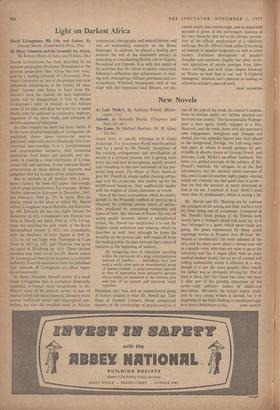New Novels
ASIDE from its specific reference to (I think) brokerage, The Acceptance World was the perfect title for a novel by Mr. Powell. Acceptance of the existing arrangements and stratification of society is a fictional premise that is getting rarer every day, and such an acceptance, equally present and refreshing in this new instalment of his pro- jected long novel, The Music of Time, seems to give Mr. Powell an almost unfair running advan- tage over his co-starters, who lumber up for the 60,000-word handicap, their saddlecloths leaden with the weights of choler, boredom, or revolt.
One of the many conventions which he quietly accepts is the Proustian method of portraying a character by collating various errors of estima- tion, produced by contrasting viewpoints and lapses of time. But whereas in Proust this way of seeing people becomes almost a metaphysical system, Mr. Powell has empiricised it to suit the English social ambitions and relations which he describes so well. And although he keeps his morality on the private side, well roped off from the reading public, he does intimate that a sense of relations is the beginning of wisdom:
By recognising laws of behaviour operating within the microcosm of a large consanguineous network of families . . . individuals born into such a world often gain an unsentimental grasp of human conduct: a grasp sometimes superior to that of apparently more perceptive persons whose minds are unattuned to the constant give and take of an ancient and tenacious social organism.
Doubtless very true, and an unsentimental grasp of human conduct is what Mr. Powell has. Like those of General Conyers, whose unexpected mastery of the terminology of psycho-analysis is
one of the joys of the book, his creator's expatia- tions on human oddity are 'neither shocked nor facetious nor caustic.' The incomparable Widmer- pool is here again, briefly engaged to a Mrs. Haycock, and the book closes with the narrator's own engagement. Stringham and Templer are absent, but two splendid figures take their places in the foreground, Erridge, the Left-wing reluc- tant peer, in whom it would perhaps be per- missible to discern traces of George Orwell, and Jeavons, Lady Molly's ex-officer husband. The latter is a perfect example of the subtlety of Mr. Powell's methods. He intrigues us at the first introduction, but the narrator seems unaware of this, and it is not for another eighty pages—during which our curiosity has had good time to grow— that we find the narrator as much interested in him as we are. I enjoyed At Lady Molly's even more than its predecessors, which is saying a lot.
Mr. Martin and Mr. Hastings are by contrast the youngest of the young, and their world is very far from being one of acceptance. Compared to Mr. Powell's lively picture of the Thirties both novels have a strangely dated and passé air, as if they belonged to a genre which never really got going, the genre represented by those youth reportage stories in Penguin New Writing. Mr. Martin is considerably the more talented of the two, and his short novel about a sixteen-year-old in a seaside town, who does not want to go to the university and has a vague affair with an older medical student (male), has an air of stunted and stifling authenticity which is effective in a way, though it is not the more graphic effect which the author was so obviously striving for. Plot at least is there, but The Game has none, nor does it offer any of the possible attractions of the novel—only splintery dashes of child's-eye description. Obviously the subject matter avail- able to very young writers is limited, but it is dispiriting to see them fiddling so unenterprisingly in so stale a backwater as this. JOHN B/OLEY
































 Previous page
Previous page